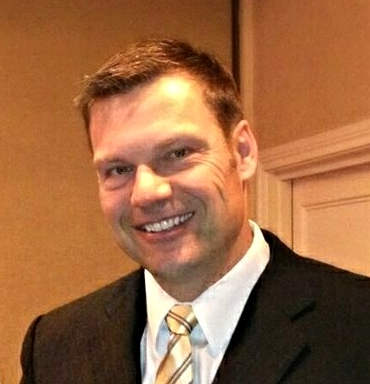
TOPEKA, Kan. — Democrats horrified by the thought that provocative conservative Kris Kobach could be Kansas’ next governor are attacking a Kansas City-area businessman whose independent candidacy could thwart their ambitions and help elect the Republican.
Their reaction to Greg Orman, the 49-year-old founder of a private equity fund, contrasts sharply with Democrats’ embrace of Orman during a U.S. Senate run in 2014 that garnered national attention. This time, Democrats have launched a legal challenge aimed at removing Orman from the November ballot, and a state board plans to consider it Thursday.
Orman expects to tap discontent with the two major parties to become his red state’s first independent governor, and supporters contend political scientists and partisan activists greatly underestimate voters’ disgust with the hyper-partisanship in U.S. politics. He’s also willing to spend his own funds, dropping $650,000 in July, a large sum in low-cost Kansas.
But outside his camp, Orman is seen as a spoiler battling for the same votes the Democratic nominee needs from GOP moderates and unaffiliated voters alienated by Kobach’s in-your-face conservatism and ties to President Donald Trump.
“Let’s say he picks up 15, 16 per cent, and Kobach wins with less than 45 per cent,” said Chris Reeves, a Kansas City-area activist who represents Kansas on the Democratic National Committee. “Greg Orman better be prepared to be run out of town on a rail.”
A top Democrat’s aide filed a formal objection with the state this week questioning the validity of petitions signed by registered voters that Orman submitted to the state to gain his ballot spot. Orman’s campaign has called the objection “frivolous.” A lawsuit appears likely whatever the board’s decision Thursday.
“Voters are going to have a clear choice in the fall,” Orman said during a recent interview. “And it’s going to be between someone who’s an independent and an outsider and is going to serve them and someone who is a lifetime, career partisan politician.”
Kobach, 52, the Kansas secretary of state, defeated Gov. Jeff Colyer in the Republican primary after being tweet-endorsed by Trump. Kobach promises to slash taxes, push for tough state laws against illegal immigration and sustain strong anti-abortion laws. An advocate of strict voter ID laws, he was vice chairman of a now-disbanded Trump commission on voter fraud.
The Democratic nominee, state Sen. Laura Kelly, 68, of Topeka, sees Kobach’s brand of conservatism as a threat to public schools and government services. She supports abortion rights.
Kobach lumps Kelly and Orman together: “My two opponents are well to the left.”
Kelly contends disaffected GOP moderates and unaffiliated voters will support her instead of Orman, seeing her as the best chance to beat Kobach.
“I don’t think that they’re going to waste their vote,” she said.
Orman calls for steps to improve the state’s business climate, promises progress on bipartisan goals such as promoting green energy and has outlined government transparency proposals. He described himself in 2014 as “pro-choice” on abortion but now avoids labels and says he would work to decrease unwanted pregnancies.
The U.S. has only one independent governor, Bill Walker of Alaska, and two independent U.S. senators, Angus King of Maine, and Bernie Sanders of Vermont, now seen as the patriarch of democratic socialism. Orman is the most serious independent candidate for Kansas governor since the 1930s.
“An Orman victory, I think, would elevate the quality of independent candidates everywhere in the country,” said Charles Wheelan, a Dartmouth University senior economics lecturer and co-chairman of Unite America, a centrist group backing Orman and other independents.
Orman, a Princeton graduate, established an energy-efficient lighting company and was a Kansas City Power & Light Co. executive after the utility bought it in 1996. He helped found the Denali Partners equity fund in 2004. He takes on stakes in outside firms and has an active management role in them.
Republicans hashed over Orman’s business dealings in 2014, and Kobach resurrected some of their criticism recently. But Democrats also are chiming in.
Kansas Senate Democratic Leader Anthony Hensley — whose chief of staff filed the legal challenge to Orman’s candidacy — derided Orman as a “vulture capitalist.” But Orman said his approach is to hold businesses and grow them.
His relationship with prominent Democrats was less contentious four years ago as he ran as an independent against veteran Republican U.S. Sen. Pat Roberts.
The Democratic nominee dropped out after Orman did well in early polling, and the party fought successfully in court against efforts — by Kobach — to force it to name a replacement candidate. Roberts ultimately won, but only after the GOP brought in big stars like Sarah Palin and made his race about regaining control of the U.S. Senate.
Afterward, Orman wrote a book, “A Declaration of Independents,” about breaking the “two-party stranglehold” on American politics. He concedes that independents can’t get elected if disaffected voters don’t see them as having a solid chance of winning.
In Kansas, the GOP began a clean sweep of statewide and congressional races in 2010, and 44 per cent of the state’s 1.8 million registered voters are Republicans. Yet over the past 50 years, the state has alternately elected GOP and Democratic governors as Democrats exploited rifts between conservative and moderate Republicans.
Unaffiliated voters outnumber registered Democrats by about 122,000; some 31 per cent of voters are unaffiliated and 24 per cent are Democrats. Orman said his “core challenge” is exciting unaffiliated voters enough to get them to the polls.
“So often, they look at the choices they’re presented as two bad options,” he said. “You know, they’re being forced to choose between the shingles and the flu, and they don’t want either.”